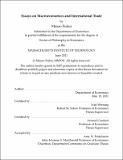Essays on Macroeconomics and International Trade
Author(s)
Fukui, Masao
DownloadThesis PDF (3.236Mb)
Advisor
Werning, Iván
Costinot, Arnaud
Terms of use
Metadata
Show full item recordAbstract
This thesis consists of three essays. In the first essay, I develop a new theory of wage rigidity and unemployment fluctuations. The starting point of my analysis is a generalized version of Burdett and Mortensen’s (1998) job ladder model featuring risk-neutral firms, risk-averse workers, and aggregate risk. Because of on-the-job search, my model generates wage rigidity both for incumbent workers, through standard insurance motives, and for new hires, through novel strategic complementarities in wage-setting between firms. In contrast to the conventional wisdom in the macro literature, the introduction of on-the-job search implies that: (i) the wage rigidity of incumbent workers, rather than new hires, is the critical determinant of unemployment fluctuations; (ii) fairness considerations in wage-setting dampen, rather than amplify, unemployment fluctuations; and (iii) new hire wages are too flexible, rather than too rigid, in the decentralized equilibrium. Quantitatively, the wage rigidity of incumbent workers caused by the insurance motive alone accounts for about one-fifth of the unemployment fluctuations observed in the data.
In the second essay (joint with Arnaud Costinot and David Atkin), we study the relationship between international trade and development in a model where countries differ in their capability, goods differ in their complexity, and capability growth is a function of a country’s pattern of specialization. Theoretically, we show that it is possible for international trade to increase capability growth in all countries and, in turn, to push all countries up the development ladder. This occurs because: (i) the average complexity of a country’s industry mix raises its capability growth, and (ii) foreign competition is tougher in less complex sectors for all countries. Empirically, we provide causal evidence consistent with (i) using the entry of countries into the World Trade Organization as an instrumental variable for other countries’ patterns of specialization. The opposite of (ii), however, appears to hold in the data. Through the lens of our model, these two empirical observations imply dynamic welfare losses from trade that are small for the median country, but pervasive and large among a few developing countries.
In the third essay, I build a model of endogenous capital flow reversal. In the data, Capital tends to flow from fast-growing countries to slow-growing countries, contrary to the prediction of neoclassical models. I propose a parsimonious theory in which slower growth causes capital inflow. The theory builds on the idea that financial development is demand-driven. In the model, a relatively larger demand for store of value in slow-growing countries stimulates domestic financial innovation. The endogenous response of financial development can be strong enough to attract capital inflow. This contrasts with the existing theories in which slow-growing countries happen to have relatively well-developed financial markets.
Date issued
2021-06Department
Massachusetts Institute of Technology. Department of EconomicsPublisher
Massachusetts Institute of Technology